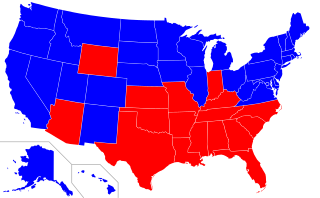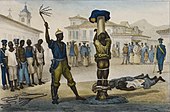
Spanking is a form of corporal punishment involving the act of striking, with either the palm of the hand or an implement, the buttocks of a person to cause physical pain. The term spanking broadly encompasses the use of either the hand or implement, the use of implements can also refer to the administration of more specific types of corporal punishment such as caning, paddling and slippering.

A corporal punishment or a physical punishment is a punishment which is intended to cause physical pain to a person. When it is inflicted on minors, especially in home and school settings, its methods may include spanking or paddling. When it is inflicted on adults, it may be inflicted on prisoners and slaves.

Flagellation, flogging or whipping is the act of beating the human body with special implements such as whips, rods, switches, the cat o' nine tails, the sjambok, the knout, etc. Typically, flogging has been imposed on an unwilling subject as a punishment; however, it can also be submitted to willingly and even done by oneself in sadomasochistic or religious contexts.

Caning is a form of corporal punishment consisting of a number of hits with a single cane usually made of rattan, generally applied to the offender's bare or clothed buttocks or hands. Caning on the knuckles or shoulders is much less common. Caning can also be applied to the soles of the feet. The size and flexibility of the cane and the mode of application, as well as the number of the strokes, may vary.
A spanking paddle is an implement used to strike a person on the buttocks. The act of spanking a person with a paddle is known as "paddling". A paddling may be for punishment, or as an initiation or hazing ritual.

Purley High School for Boys existed from 1914 to 1988. Originally located in Purley from 1914, in 1936 it relocated to Placehouse Lane, Old Coulsdon, London Borough of Croydon. The school was Purley County Grammar School from 1914 to 1969, becoming Purley Grammar School for Boys and then, in 1973, Purley High School for Boys after the abolition of the Grammar School system and the implementation of the Comprehensive System.

Slippering is a term for the act of smacking the buttocks, or the hands, with a slipper or a slide as a form of corporal punishment. A slippering on the buttocks is a form of spanking; it is a much more common method than slippering on the hands. The verb "to slipper" means "to give a slippering". Slipperings are particularly associated with Britain and Commonwealth countries, although not exclusively so.

Corporal punishment is banned in the penal and education systems of the Republic of China (Taiwan), but there are no laws banning its use in the home. However, as of 22 March 2023, there is a draft amendment of Article 1085 of the Civil Law that may make some forms of corporal punishment in the home illegal if it comes into effect.

Ingraham v. Wright, 430 U.S. 651 (1977), was a United States Supreme Court case that upheld the disciplinary corporal punishment policy of Florida's public schools by a 5-4 vote. The judgment specified that such corporal punishments have no prohibition in public schools unless those punishments are “degrading or unduly severe”.
Jordan Riak was a teacher and activist against corporal punishment who drafted the 1986 bill which banned corporal punishment from public schools in California.

Strapping refers to the use of a strap as an implement of corporal punishment. It is typically a broad and heavy strip of leather, often with a hard handle, the more flexible 'blade' being applied to the offender.

School corporal punishment is the deliberate infliction of physical pain as a response to undesired behavior by students. The term corporal punishment derives from the Latin word for the "body", corpus. In schools it may involve striking the student on the buttocks or on the palms of their hands with an implement such as a rattan cane, wooden paddle, slipper, leather strap or wooden yardstick. Less commonly, it could also include spanking or smacking the student with an open hand, especially at the kindergarten, primary school, or other more junior levels.

Judicial corporal punishment is the infliction of corporal punishment as a result of a sentence imposed on an offender by a court of law, including flagellation, forced amputations, caning, bastinado, birching, or strapping. Legal corporal punishment is forbidden in most countries, but it still is a form of legal punishment practiced according to the legislations of Brunei, Iran, Libya, the Maldives, Malaysia, Saudi Arabia, Singapore, the United Arab Emirates, Yemen, and Qatar, as well as parts of Indonesia and Nigeria.

Physical or corporal punishment by a parent or other legal guardian is any act causing deliberate physical pain or discomfort to a minor child in response to some undesired behavior. It typically takes the form of spanking or slapping the child with an open hand or striking with an implement such as a belt, slipper, cane, hairbrush or paddle, whip, hanger, and can also include shaking, pinching, forced ingestion of substances, or forcing children to stay in uncomfortable positions.

Corporal punishment, sometimes referred to as "physical punishment" or "physical discipline", has been defined as the use of physical force, no matter how light, to cause deliberate bodily pain or discomfort in response to undesired behavior. In schools in the United States, corporal punishment takes the form of a school teacher or administrator striking a student's buttocks with a wooden paddle.

Corporal punishment of minors in the United States, meaning the infliction of physical pain or discomfort by parents or other adult guardians, including in some cases school officials, for purposes of punishing unacceptable attitude, is subject to varying legal limits, depending on the state. Minor children in the United States commonly experience some form of corporal punishment, such as spanking or paddling. Despite opposition from medical and social-services professionals, as of 2024, the spanking of children is legal in all 50 states and, as of 2014, most people still believe it is acceptable provided it does not involve implements. Corporal punishment is in the United States usually considered distinct from illegal child abuse, although the distinction can often be vague.
The Islamic Republic of Iran signed the UN Convention on the Rights of the Child (CRC) in 1991 and ratified it in 1994. Upon ratification, Iran made the following reservation: "If the text of the Convention is or becomes incompatible with the domestic laws and Islamic standards at any time or in any case, the Government of the Islamic Republic shall not abide by it."
The legality of corporal punishment of children varies by country. Corporal punishment of minor children by parents or adult guardians, which is intended to cause physical pain, has been traditionally legal in nearly all countries unless explicitly outlawed. According to a 2014 estimate by Human Rights Watch, "Ninety percent of the world's children live in countries where corporal punishment and other physical violence against children is still legal". Many countries' laws provide for a defence of "reasonable chastisement" against charges of assault and other crimes for parents using corporal punishment. This defence is ultimately derived from English law. As of 2024, only three of seven G7 members including seven of the 20 G20 member states have banned the use of corporal punishment against children.

Elizabeth Thompson Gershoff is Professor of Human Development and Family Sciences at the University of Texas at Austin. She is known for her research on the impact of corporal punishment in the home and at school on children and their mental health.
George Walker Holden is a professor and developmental psychologist working at the Southern Methodist University, where he was the former Chair of the Psychology Department. Holden is the co-founder of the U.S. Alliance to End the Hitting of Children and the author of several books on the subject of child development.







